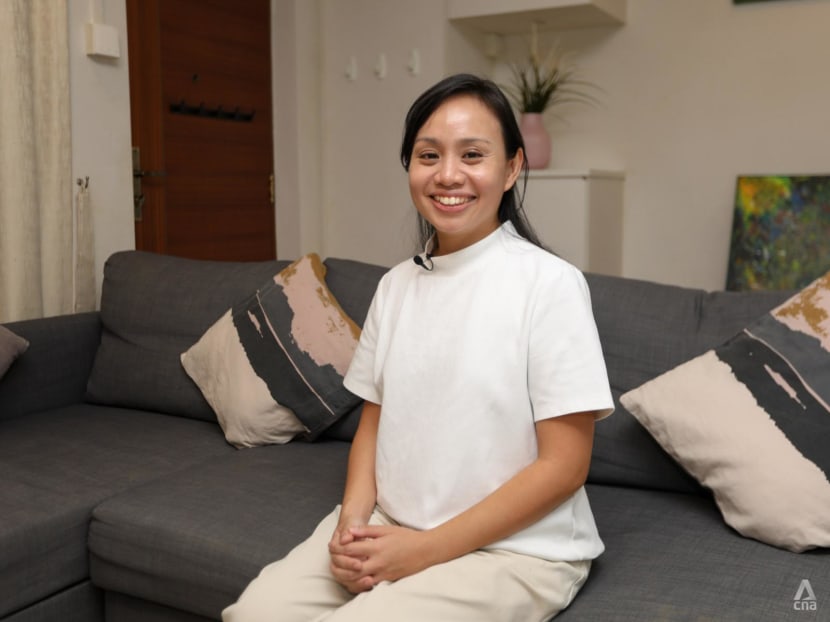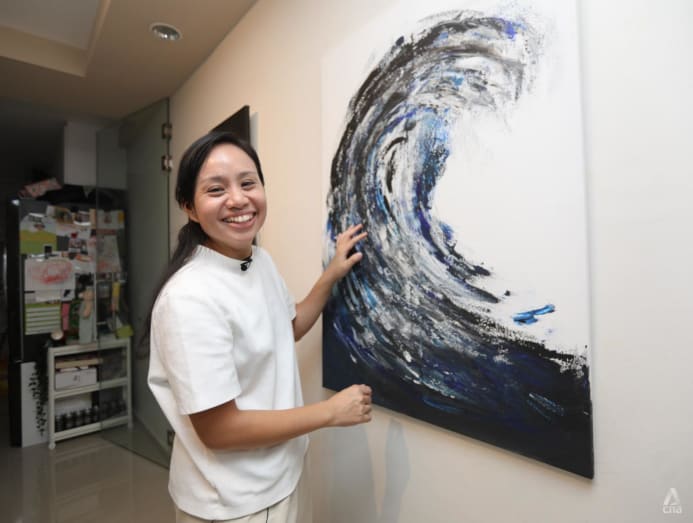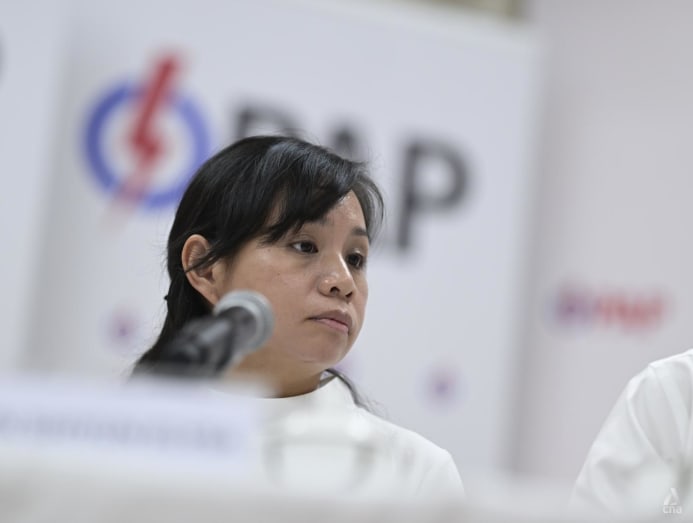GE2025: As a journalist, she used to think the PAP was 'paternalistic'. Now, she's standing for elections under its banner
Charity director Elysa Chen recalled how her career path took a different turn after she covered a case involving a broken family as a reporter.

People’s Action Party’s candidate Elysa Chen (pictured) is part of a four-member team led by Transport Minister Chee Hong Tat contesting Bishan–Toa Payoh Group Representation Constituency. (Photo: CNA/Mak Jia Kee)

This audio is generated by an AI tool.
Right when Ms Elysa Chen was about to sit for her preliminary examinations in Secondary 4, she received the news that her cancer-stricken father had died.
“At that moment, you can’t grieve," she said, recalling that incident several decades ago.
The 41-year-old's thoughts then returned to the present. We are in her apartment on a weekday evening.
Now a candidate running for the General Election with the People's Action Party (PAP), she figured that bad news and tough times can still come in different ways.
"You have to hold the difficult moments and press on so that you can show up for your team. You get the work done. You make sure that life goes on.
"As a leader, you have to do that, right?"
Adversity shaped her in her teenage years.
The candidate for Bishan-Toa Payoh Group Representation Constituency (GRC) said that dealing with her father’s death made her “grow up” and “experience society very quickly”.
Losing the sole breadwinner of her family forced her to take up multiple jobs at the time – being a tuition teacher, hotel phone operator, sales operator and banquet server.
Today, Ms Chen is the director of social service agency CampusImpact, a charity that aims to build character in young people as they transit from childhood to adulthood.
When we spoke, the hustings haven't started because it was the day before Nomination Day.
Despite having worked at her charity job for half the day, recording a podcast, needing to wake up early the next morning to submit her nomination papers and being interviewed by me, Ms Chen bore no signs of fatigue.
She was vivacious and her face lit up whenever she spoke about the children at her charity, who come from challenging backgrounds.
During our interview, she would make self-deprecating remarks and laugh loudly while showing us her son’s toys and drawings. Her voice rose in pitch as she excitedly welcomed her mother and a party volunteer when they arrived through her front door.
One might think her energetic personality is just par for the course for a candidate trying to canvass voters.
However, in the few days that I have gotten to know her, Ms Chen just seemed to be someone who is deeply interested in other people.
I followed her on one of her walkabouts and was impressed by how she recognised the faces of several residents while distributing flyers at coffee shops, even though she is a new candidate and must have had limited opportunities to walk the ground compared to her more experienced colleagues.
I have to admit being surprised by her extroversion. In preparing for my interview with Ms Chen, who was a former journalist at The New Paper, I asked around and heard from her ex-colleagues that she was a shy worker who mostly kept to herself and diligently carried out her work.
No one had thought that she would want to step forward to serve Singapore through politics.
Clearly, much must have happened in between the time she stepped out of a Singapore Press Holdings (SPH) newsroom and into a PAP branch office. In the interim years, she became a teacher, church pastor and, finally, a charity director.
BEFORE IT GETS TO THE CRIME SCENE
Ms Chen worked as a reporter on the crime beat right after graduating from Nanyang Technological University with a communication studies degree in 2007. Coincidentally, I graduated from the same programme last year, 17 years after she did.
Sitting on the sofa in her home, she reflected on how journalism gave her the opportunity “to see the world from behind the safety of a press pass”.
“It gives you exposure to so many segments in society that really helps you to have a broader perspective to understand how they live,” she said.
Ms Chen added that in one moment, she could be in a “palatial bungalow” and in the next, she would be in a one-room flat.
Her years in journalism were incredibly action-packed.
She spoke about how she exposed a prostitution ring in the middle of a Sembawang jungle. She also had to navigate a thick forest during Singapore's hunt for prison escapee Mas Selamat in 2008 – while dressed in a pencil skirt and heels after attending a press conference.
She chuckled, still incredulous at the memory.
Then, there was one particular news report she did that left a particularly deep impression and made her reconsider her career path.
It was a case of a man who murdered his two young children because his wife was initiating a divorce from him. He then leapt to his death right in front of his wife.
“Too often as journalists, we always arrive on the scene just that bit too late. When I encounter stories like that, it makes me feel that we could have prevented this tragedy,” she said.
“We can do so much more for families that are going through a crisis. And that’s a really big motivation why I have been doing what I’m doing and why I decided to step up to serve.”
Right now, as a charity director, she thinks that her job is more inspiring because she is not just telling other people's stories but also writing these stories with them.
“You are not just reacting, but the one making the change. It’s like those kinds of movies where you have the chance to stop, rewind and be able to intervene before they get there.”

FAMILY IS THE “BATTERY” THAT SHE NEEDS
For Ms Chen, working with children at the charity and the cases she encountered in her past job showed her that strong familial ties are so important.
On the dynamics in her own family, she said that even after she lost her father – a church deacon – in her youth, how he had conducted himself continued to influence her.
She said that he was always the “first in, last out”. He did more than he spoke, at one moment cooking barley in the kitchen to serve people and then in the next moment, leading a service at church.
“So the ability to straddle both showed me that he was really there to serve and help people. He wasn’t in it for himself,” she added.
Throughout our interview, Ms Chen's husband was listening to us at the corner of the hall, guiding her on how to phrase some of her answers when she asked him for help.
“I wouldn’t be where I am and who I am today, if I didn’t have my family,” she declared.
“It is that battery that I need. It constantly anchors me and tells me why I do what I do.”
She said that when she gets home and collapses in bed on tiring days, seeing her child next to her reminds her that everything she does is for her family.
Her father’s death also taught her to cherish the small moments such as hugging her child in between events, which she thinks is “worth a million bucks”.
Talking about her work with CampusImpact, her face glowed with pride when she recounted her organisation’s initiatives. She gave the example of a photography exhibition that showcased pictures captured by the children.
“It was really nice to see the world through the lens of a child. We managed to invite then-President of Singapore Halimah Yacob to be our guest-of-honour and she was amazed by what the kids produced.”
Ms Chen's interactions with children at her walkabout warmed my heart. She would bend down to shake their hands and you could tell that she is experienced with the young ones by the way she changed her manner of speech to talk to them.
“I’m a people person,” she chirped.
Before working at the charity, Ms Chen was also a pastor and a junior college General Paper lecturer at Hwa Chong Institution.
By this point in the interview, it was obvious to me what her pet causes would be if she were elected. Her desire to advocate for the young is borne out of many years working with them and helping to improve their lives.
Ms Chen believes that young people have many ideas and she wants to give them more platforms where they may channel their energy and passion.
“I want to do more for children from low-income families. That has always been my big passion. I really see so much potential in every child, but if they have the potential and no opportunities, that’s a big waste,” she said.

USED TO THINK BADLY OF PAP
Then, probably because of the impact her charity work has created, politics came knocking.
I asked her why she chose to run for the election under the PAP banner, but did not expect to hear that Ms Chen had harboured negative sentiments towards the party in the past.
“I used to think that PAP was very paternalistic. It was largely from my time as a journalist, hearing how editors had to go for meetings with the authorities because of certain articles they wrote – it really coloured my perception,” she recalled.
So what changed her mind?
She said that having conversations with party members made her realise that PAP respected diverse views within the party and she approved of Prime Minister Lawrence Wong’s “consultative approach with the Forward SG exercise”.
The exercise was a year-long review of the country’s social compact to chart Singapore’s future.
She “saw the purity of their intentions” and “the sweat on their brows".
“I think that sincerity won me over. I also know that they had the gumption to make difficult policy decisions, even if it would be taken negatively,” she said.
In 2018, Home Affairs and Law Minister K Shanmugam visited her charity, which was located in his ward of Chong Pang.
She said: “He comes across in parliament as this bulldog character, but when I met him, he was so kind, so gentle. I couldn’t believe this was the same minister.”
Her charity CampusImpact serves about 200 children. She reckoned that stepping up to be a parliamentarian would mean that she could potentially deliver help on a bigger scale, which can have an impact on tens of thousands of residents.
“That’s why I am trying to do my bit for this country that I love.”
When I asked her about anxieties for the future, she answered that it would be how power – to have a say in policymaking if elected – might change her.
“I know my heart now, but sometimes power can do crazy things to people. Would my heart ever harden? Would I become someone who doesn’t care? I would be terrified to lose that,” she said.
“I think that would be the beginning of the end for me. I hope that I never lose this sense of purpose and this drive.”
Ms Chen kept busy at home that night – no respite from her activities in the day. Tending to her crying child, consulting a party volunteer about her schedule, doing a recording for our video footage and serving us drinks, she seems accustomed to – and even embraces – noise.
That corresponds with her idea of success. She told me that she felt that success is not defined by attaining a certain income level or by how large someone’s house is.
That is why, although she lives in a public housing unit, she thinks that she is successful because she believes that her life is full of meaning and joy. There are many things that she is grateful for, like the love and warmth she experiences in her home, she said.
“We are really successful when we can give back.”



.jpg?itok=ACZ-kG0H)
.jpg?itok=pgz49ncK)









